Project Prayer: Ramadan 2020
30 days of questions and prayer
for the Muslim world
By Gary Fallesen, founding president, Climbing For Christ
DAY 30 (Saturday, May 23): Should I keep praying?
Ramadan ends today, but our prayer lives should continue to include those in the Muslim world.
Climbing For Christ is part of a network of ministries participating in what is called the 10/10 Prayer and Fasting Initiative. Starting in October 2017, we began praying that God would lead at least 10 percent of the Muslim population to Jesus in 10 years.
We have always had a heart for the Muslim world in this ministry, which is why we have conducted “30 Days of Prayer for the Muslim World” the past 11 years. I’d been to numerous Muslim countries, but when I found myself in a remote village in China on Mission: Possible 2008, I came upon a mosque. I could not believe my eyes. Muslims had already established a base in a village where there were no Christians in a communist country that persecutes anyone who isn’t an atheist.
“Do Muslims go on mission trips?” we asked on Day 16. Yes, they are evangelizing the world, too.
.jpg)
A mosque in an unreached village in China. (Photo by Gary Fallesen)
We, as Christ followers, have work to do. And that work starts on our knees with our hearts bowed before the Lord. Pray on!
The Word: “Therefore, go and make disciples of all the nations, baptizing them in the name of the Father and the Son and the Holy Spirit” (Matthew 28:19, NLT).
Pray on! Father, we ask that You move in the Muslim world and bring at least 10 percent of those in Islam to faith in Christ. Have Your way, Lord, and use us to serve and glorify Your name. We pray this and all things in the powerful name of Jesus. Amen! CLICK HERE for another excellent video on this subject by Prayercast.
SCROLL DOWN FOR PREVIOUS DAYS
Introduction
“Stay alert! Watch out for your great enemy, the devil. He prowls around like a roaring lion, looking for someone to devour.” – 1 Peter 5:8 (NLT)
We are, by nature, easily distracted. Look at the squirrel! But probably never more so than in recent weeks and months during the COVID-19 pandemic. In many cases it has taken our eyes off the cross and put them on, well, toilet paper. And facemasks. And sheltering in place. And staying alive.
Never mind that more than 5.2 billion people in the world are already dead.
Only 31.1 percent of the planet’s population follow Jesus Christ. The rest follow Islam (23.9 percent), Hinduism (15.2 percent), atheism (12.9 percent), folk religions (9.5 percent), Buddhism (6.5 percent), and other smaller hell-bound cults and practices (0.9 percent), according to the Joshua Project.
For the next 30 days, we at Climbing For Christ are going to renew our focus on reaching the lost by turning our eyes toward the cross at Calvary and praying for the more than 1.83 billion Muslims around the world.
First, percentages and numbers are empty figures. We need to put a face to the issue, any issue, in order to give it life. As you pray, picture a Muslim friend, co-worker, fellow student, or someone you have met in your community. Connect your heart to their heart.
.jpg)
Two sisters, above, and a horse boy who works on Mount Ararat in eastern Turkey. (Photos by Gary Fallesen)
.jpg)
We have participated in the 30 Days of Prayer for the Muslim World for the past 10 years. A decade of learning more about Islam and its followers – the people and places – and interceding on their behalf. Today, we begin that journey again.
Each day, from today through May 23, we will pose one question about the Muslim world, attempt to answer it, and then pray together for those following Islam. If you have a question, email us at info@ClimbingForChrist.org and we’ll try to address it. Please – please – take a moment (or more) every day for the next 30 days and pray for the more than 1.83 billion Muslim around the world.
Ask the Good Shepherd to find one lost sheep. And then another. And then another.
Remember, as Peter wrote, “Be sober-minded; be watchful” (1 Peter 5:8a, ESV). Don’t be distracted. The devil wants nothing more than to devour the more than 5.2 billion souls currently apart from our God. Pray on!
DAY 1 (Friday, April 24): What is Islam?
Islam literally means “submission” to the will of Allah. Allah is Arabic for “the god.” Members of Islam are called Muslims – “those who submit.” Islam was founded by Muhammad, who lived from 570 to 632.
Islamic tradition claims Allah sent 128,000 prophets to earth. The last and greatest of these, Muslims say, was Muhammad. Muhammad was 40 when Muslims believe he was visited by the angel Gabriel, who they say began delivering him messages from Allah. Those messages were dictated by the illiterate Muhammad to his disciples and make up the Qur’an, the most holy book of Islam.
Islam is the second biggest religion in the world. The largest Muslim countries are Indonesia (with about 221 million) and Pakistan (213 million), both of which Climbing For Christ serves. Another Muslim country in which we work is Turkey (eighth-largest with about 80 million).
The Word: “For, there is one God and one Mediator who can reconcile God and humanity – the man Christ Jesus” (1 Timothy 2:5, NLT).
Pray on! Heavenly Father, we acknowledge You – the God of the Bible – as the one true God. We ask that You reveal Yourself to Muslims throughout the world during this, their holy month of Ramadan. May they seek revelation from Allah, but instead be reconciled with You through Your Son, Jesus Christ.
DAY 2 (Saturday, April 25): What do Muslims believe?
There are five doctrines – or essential beliefs – in Islam: 1. God (Allah); 2. Angels; 3. Holy books, including the Torah of Moses, Psalms of David, Gospel of Jesus Christ, and the Qur’an; 4. Prophets (of which Jesus was one); and 5. Future judgment.
There also are five pillars – primary duties or obligations – in Islam. These required acts are:
- Shahadah, which means “to bear witness.” This is a creed recited daily and publicly: “There is no god but Allah and Muhammad is the Prophet of Allah” (from the Qur’an, Surah 4:136).
- Salat or prayers, which are to be offered five times a day: dawn, noon, afternoon, evening, and night. In Muslim countries, a call to prayer reminds followers it is time to pray.
- Zakat or giving alms (1/40th of a person’s income) to the community.
- Ramadan, the ninth month of the Muslim lunar year, during which Muslims must fast from food, drink, smoking, and sex during daylight hours. They can partake in those things after sundown until sunrise the next morning.
- Hajj, the pilgrimage to Mecca, which is expected at least once in a person’s life. Muslims believe that going on this pilgrimage enhances their chance for salvation.
The Word: “For it is by grace you have been saved, through faith – and this is not from yourselves, it is the gift of God – not by works, so that no one can boast” (Ephesians 2:8-9, NIV).
Pray on! Father God, we know that every good and perfect gift is from You, the Father of lights, including the gift of salvation. We cannot earn Your love; You give it to us freely through faith. May those in the Muslim world who are trapped feeling they need to work their way into heaven be introduced to the One, Jesus Christ, who declared it is finished.
DAY 3 (Sunday, April 26): What is Ramadan?
.jpg)
Iftar – the fast-breaking dinner – after sunset in Turkey. (Photo by Gary Fallesen)
We have slept in the homes of Muslims during Ramadan, rising early with them – before the sun comes up – to eat a substantial meal. This isn’t breakfast; it is the beginning of the daily fast (called suhur).
During daytime hours, most restaurants are closed. They re-open shortly before sunset, prepared to greet many hungry customers who have refrained from eating and drinking all day.
We watched a man sit at a table outside a restaurant in eastern Turkey a full hour before sunset. When the day’s fast finally ended he feasted on a large meal. This fast-breaking meal is called iftar. Ironically, many Muslims gain weight during Ramadan because of the time and amount that they eat.
The Hadith, a record of Muhammad’s words and actions, states: “Whoever observes fasts during the month of Ramadan out of sincere faith, and hoping to attain Allah’s rewards, then all his past sins will be forgiven” (Hadith 1:37).
The month of Ramadan is important to Muslims because they believe Muhammad received the revelation of the Qur’an during this month. The spiritual rewards are thought to be multiplied by fasting as Muslims strive for purity and heightened awareness of Allah.
The Word: “But if we confess our sins to him, he is faithful and just to forgive us our sins and to cleanse us from all wickedness” (1 John 1:9, NLT).
Pray on! Father God, please forgive us our sins and cleanse us of unrighteousness. We pray for those who follow Islam, asking that Your Spirit would soften their hearts and they would repent for their words and actions – just as we ask for forgiveness for those times when our words and deeds were not glorifying to Your name.
DAY 4 (Monday, April 27): How did Muhammad become a prophet?
The founder of Islam wasn’t born a prophet. He was orphaned as a boy (his father died before his birth and his mother died when he was 6), and then cared for by his grandfather and briefly by an uncle. The Qur’an states that he grew up in poverty (Surah 93:6-7) in the Arab Quraysh tribe.
Muhammad was born into a culture that believed in many gods and even practiced animism. The Quraysh tribe inhabited and controlled Mecca, where 360 gods and idols were worshiped inside the black stone shrine Ka’ba. (The Ka’ba is now the center of Islam’s most important mosque.)
Travels as a merchant exposed Muhammad to other religions, including Nestorians, unorthodox Christians who denied that Jesus was both fully God and fully man. Muhammad also married a woman who was an Ebionite Christian; believers who denied the deity of Jesus. These things may have influenced Muhammad’s later teaching that Jesus was not God – nor the Son of God or our Savior Redeemer. Muhammad claimed Jesus was a man who was a prophet of God.
After marrying (he was 25, his wife – a widow who employed him – was 40), Muhammad spent much of his next 15 years in solitary meditation. This led to the revelation that gave birth to Islam. (More on this tomorrow.)
The Word: “For in Christ lives all the fullness of God in a human body” (Colossians 2:9, NLT).
Pray on! Heavenly Father, we know that “In the beginning was the Word (Your son Jesus), and the Word was with God, and the Word was God” (John 1:1). We know that Jesus is Your only begotten Son, and that He became flesh and dwelt among us (John 1:14). We give You thanks for sending Him to live with us and to die for us. Because of Him, we can live eternally with You. May those who deny who Jesus was and is learn the Truth.
DAY 5 (Tuesday, April 28): What was Muhammad’s revelation?
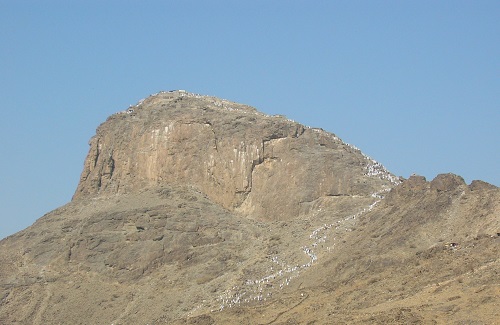
Mount Hira, a 2,100-foot mountain northeast of Mecca. (Wikipedia)
Muhammad withdrew to a cave on Mount Hira for a spiritual retreat once a year. The story goes, he was meditating – others say sleeping – when the angel Gabriel appeared to him and commanded him, “Recite in the name of your Lord who created – Created man from a clinging substance. Recite, and your Lord is the most Generous – Who taught by the pen – Taught man that which he knew not” (Surah 96:1-5).
“At first Muhammad failed to respond, and the angel seized him by the throat and shook him as he repeated the command to recite,” Ron Rhodes wrote in The 10 Things You Need to Know About Islam. “Muhammad again failed to respond, so the angel choked him until he yielded. Muhammad began to recite revelations given to him by the angel.”
Muhammad questioned the source of the revelation. He told his wife “he thought he might be possessed by jinns, supernatural beings that, according to Arabic folklore, could take human or animal form and influence human affairs” (from Fritz Ridenour’s book on world religions, So What’s the Difference?). His wife assured him the revelations were divine.
But, Rhodes wrote, “Muhammad received these revelations from the angel in an altered state of consciousness. His body was subject to ecstatic seizures. When he received revelation, his whole body became agitated, his face contorted, perspiration vigorously poured down his face, he heard bells ringing, he fell to the ground and foamed at the mouth, and he roared like a camel.”
These revelations, which took 23 years to receive, led to the writing of the Qur’an.
The Word: “But I am not surprised! Even Satan disguises himself as an angel of light” (2 Corinthians 11:14, NLT).
Pray on! Father God, please reveal Yourself to those who have been deceived by the father of lies. Thank You for calling us to be Your children. May millions of others be moved to seek You are their eternal Father.
DAY 6 (Wednesday, April 29): What is the Qur’an?
The Qur’an (or Koran) is the central religious text of Islam; it is the Bible of Islam. Muslims believe the Qur’an was a revelation by Allah to the prophet Muhammad. It is the most revered book in any Muslim home and, as such, must be kept above all other books (top shelf of any bookcase). Muslims cannot drink or smoke when reading the Qur’an and usually wash before touching the book.
The Qur’an contains 114 Surahs or chapters. It is nearly as long as the New Testament but is not anything like the New Testament. It was written by one man and is a book of proclamation. Muslims believe it is unchanged, while they claim the Christian Bible has been tampered with through the years.
Because the angel Gabriel brought the Qur’an from heaven to earth in Arabic that language is considered the authentic version. Muslims point to the many translations of the Bible as an indication that it has been corrupted.
The Word: “Do not add to or subtract from these commands I am giving you. Just obey the commands of the LORD your God that I am giving you.” (Deuteronomy 4:2, NLT).
Pray on! Heavenly Father, we know Your Word to be true. We trust in Your Word. We know that You speak to us through Your Word. We thank you for this. May others also have ears to hear.
DAY 7 (Thursday, April 30): How is the Qur’an different from the Bible?
There are many contradictions between the Qur’an and the Bible, such as:
- No Trinity. Surah 4:171 declares, “Say not ‘Three’ – Cease! … Allah is only One God.” Surah 6:116 asks, “Didst thou [Jesus] say unto mankind: Take me and my mother for two gods beside Allah?” (Muhammad mistakenly thought Christians worshiped three gods: the Father, the Mother Mary, and the Son Jesus.) Muslims consider it blasphemy to suggest that God beget Jesus. Of the 99 names ascribed to God in Islam, “Father” is omitted. Jesus is not the Son of God. Returning to Surah 4:171, it says, “The Messiah, Jesus son of Mary, was only a messenger of Allah.”
- Jesus did not die on the cross. Surah 4:157 states, “They slew him not nor crucified, but it appeared so unto them.” Muslims believe Allah took Jesus to heaven before the crucifixion because, in an honor-shame culture, it is unthinkable that a prophet would face a humiliating death. Tradition has it that Judas or possibly Simon of Cyrene was made to look like Jesus, so much so that Mary and the disciples were fooled. Another theory we have heard is that Jesus was in a coma when taken down from the cross and later revived and left the area to die elsewhere years later.
- Each person must take care of his or her own sin. “Whoso committeth sin committeth it only against himself” (Surah 4:111). Salvation is earned by following the Five Pillars of faith.
The Word: “Then Jesus said, ‘Come to me, all of you who are weary and carry heavy burdens, and I will give you rest. … For my yoke is easy to bear, and the burden I give you is light’” (Matthew 11:28, 30, NLT).
Pray on! Heavenly Father, there are so many ways for people to be deceived or confused in this world and by this world. We ask that Your Truth would set them free. We thank you for lightening our burden. May those trying to earn their way into heaven realize their futility and find Your yoke, which is easy to bear.
DAY 8 (Friday, May 1): How hard is it to reach Muslims in … Pakistan?
In the days ahead, we will look at the challenges of sharing the Gospel in Muslim countries where Climbing For Christ members live and serve.
PAKISTAN is the second-largest Muslim country in the world with a total population of more than 215 million people – 98.8 percent of whom are Muslim, according to the Joshua Project. With 0.9 percent of the population claiming to follow Christ, 99.1 percent is considered unreached. Why?
“We cannot preach the Gospel among the Muslims,” said a C4C ministry partner. “It is illegal. If anyone does, then they could suffer under the blasphemy law.”
Our ministry partner calls this committing suicide.
But some Christians do outreach among Muslims in what is considered the fifth-worst country in the world to be a Jesus follower.
“Native missionaries make great sacrifices for the sake of the Gospel,” another Pakistani pastor told us. “Many times, they go without food and they travel hundreds of kilometers just to bring the Good News of Jesus Christ.
“In some parts of Pakistan, Muslim fundamentalists attack the missionaries. Please keep them in your prayers as they seek to faithfully serve the Lord under great hardship. Islam may be the greatest challenge before the Church in this century, but it may also represent the largest potential harvest.”
That is our prayer.
A network of ministries serving in the Muslim world – of which Climbing For Christ is a member – is carrying out a 10/10 Prayer Initiative. We are praying that at least 10 percent of the world’s Muslim population will come to Christ in 10 years (from 2018 to 2028). Please join us in praying.
The Word: “You know the saying, ‘Four months between planting and harvest.’ But I say, wake up and look around. The fields are already ripe for harvest” (John 4:35, NLT).
Pray on! Father, we know that Christians in Pakistan face – in the words of a Pakistani pastor – “religious discrimination, intolerance, oppression, social subjugation, and economic deprivation.” We know there is a shortage of work, food, Bibles, houses of worship, and discipleship for our brothers and sisters. We know that it is illegal for Muslims to convert to Christianity and this Islamic Republic’s blasphemy laws can be used to persecute Jesus followers. They can be falsely or arbitrarily accused of speaking against the Qur’an or Muhammad. Please protect them, Father. Empower them with boldness and the wisdom for how to use it. May we lovingly be able to deliver God’s message of salvation and healing.
DAY 9 (Saturday, May 2): How hard is it to reach Muslims in … Morocco?
MOROCCO is 99 percent Muslim – one of 11 countries in the world with a population that is 99 percent or more Muslim. With only 0.2 percent of the population claiming to follow Christ, it is considered 100 percent unreached. Why?
“I think the hardest thing was either their indifference – to almost anything, including spiritual matters – or their mindset,” said a Climbing For Christ member who worked full-time in Morocco, a country ranked 26th on the World Watch List because of Islamic oppression.
“I’ll explain what I mean by ‘mindset.’ They call ‘new’ things ‘Romi,’ a reference to when the Romans came to North Africa. But they have no idea they ever had a different religion than Islam, which came to North Africa some four-to-five centuries later.
“By African standards, Morocco is quite developed and advanced. Yet the way people think is often stuck in seventh century Islam. That’s a serious stronghold to overcome.”
Our member complained about the demon of apathy plaguing the people, particularly the unreached Berber people living in the Atlas Mountains.
The Word: “For the Good News must first be preached to all nations” (Mark 13:10, NLT).
Pray on! Father, we ask You, please open the ears and hearts of Muslims in Morocco to receive the Good News of Jesus.
DAY 10 (Sunday, May 3): How hard is it to reach Muslims in … Indonesia?
INDONESIA is the largest Muslim country in the world with more than 221 million following Islam – or 82.1 percent of the population. Nearly 13 percent of Indonesia is Christian, but two-thirds of a population spread across nearly 1,000 islands is unreached with the Gospel. Why?
“The biggest obstacle is rejection,” our C4C Indonesia leader said. “It’s not easy for new people who are Christian to come into a new area. It’s difficult to find people who can stay long. We must make a good platform to make relationships and be a bridge (to Jesus).”
Indonesia’s government recognizes six official religions: Islam, Protestantism, Roman Catholicism, Hinduism, Buddhism, and Confucianism. But Indonesia still ranks among the 50 worst countries to be a Christian (at No. 49). Voice of the Martyrs states: “While most Indonesian Muslims practice an animistic version known as ‘folk’ Islam, proponents of radical Islamic ideology have encouraged and engaged in violence against Christians.”
Our C4C Indonesia leader calls that the “spirit of Esau,” based on the Old Testament story of Esau and his hatred for his brother Jacob (Israel). “This is (the spirit of) radical Muslims that close some Christian churches and do not like Christianity,” he said.
The Word: “The LORD reigns, let the earth rejoice; Let the many islands be glad” (Psalm 97:1, NASB).
Pray on! Father, make us aware of the unreached people in our midst, especially in Indonesia. Allow believers in near people groups to find platforms to work among those people groups not yet reached with the Good News of Your Son, Jesus. Bless the workers in this land, where we recognize that the harvest is plentiful, but the laborers are few. Raise up those willing to labor for Your glory.
DAY 11 (Monday, May 4): How hard is it to reach Muslims in … Turkey?
TURKEY is a Muslim society in which the practice of Islam has been more cultural than religious. However, it has the eighth-largest Muslim population in the world – with anywhere from 98.6 to 99.8 percent of the population claiming to follow Islam. There are said to be only about 6,000 indigenous believers in a place where Christianity first took root 2,000 years ago. Why?
“They don’t believe that God has a Son,” said one brother, a Muslim background believer. He says this is the hardest thing about trying to share Jesus with Muslims in Turkey, which ranks 36th on the World Watch List.
The spiritual soil has long been hard in the Turkish World. But God loves the people of Turkey – from Turks to Kurds – and He is at work there today. Tomorrow, we will share about one Muslim background believer in Turkey.
The Word: “I will give you a new heart and put a new spirit in you; I will remove from you your heart of stone and give you a heart of flesh” (Ezekiel 36:26, NIV).
Pray on! Heavenly Father, You sent Your Son into this world to die for the sins of all mankind. May the people of Turkey recognize Who Your Son is. Soften their hearts. Open their eyes to this Truth: that in Your Son we are set free. CLICK HERE to watch a Prayercast video on the Turkish World.
DAY 12 (Tuesday, May 5): What is a Muslim background believer?
A Muslim background believer (or MBB) is a Christian who had an Islamic background before becoming a Christ follower.
“I was born a Muslim because my parents were Muslim,” said a brother in Turkey who is an MBB. “I was a very strong Muslim; five times in a day I was praying and every year I was fasting for one month (Ramadan).”
When we first met this brother, he was observing Ramadan. He would fast from sunrise to sunset and then feast after dark and before light.
“We went up the Mountain Ararat together,” he said, sharing his testimony. “We were camping. They told me about the Bible and about the Christian religion. But the first time I wasn’t interested at all.”
After our team left Turkey, this brother “was feeling something” because of what we had shared. “They (were) such amazing people was why I was feeling something,” he said. “I downloaded a Bible and I started reading sometimes when I was by myself.” He said he thought the Bible was “similar to the Qur’an and I decided to stay in my religion.”
That’s when we showed up again. He heard more about Jesus and our faith. A friend of his, another MBB we had met several years before, encouraged him to listen to us. God gave him ears to hear and he became, as he likes to say, “part of the family.”
During Mission: Turkey 2019, we were sharing more with him – teaching, really – as we trekked in the Aladaglar Mountains. “Just before we finished the tour, I had a dream,” our brother said, explaining that this fully convicted him to be an MBB. “I love to be a Christian.”
This is the first Ramadan in his adult life that he has not fasted. He is now praying for and sharing with those all around him.
The Word: “Since we are receiving a Kingdom that is unshakable, let us be thankful and please God by worshiping him with holy fear and awe” (Hebrews 12:28, NLT).
Pray on! Father, we give You praise and thanks for Muslim background believers. We are grateful for the way Your Spirit works in their hearts and lives and leads MBBs out of the darkness into Your marvelous light. We ask, Lord, that you would work in many Muslims during this Ramadan – using believers like us to witness to them and using dreams and visions to touch them. May we hear many more MBBs declare their love for You!
DAY 13 (Wednesday, May 6): What are Whirling Dervishes?
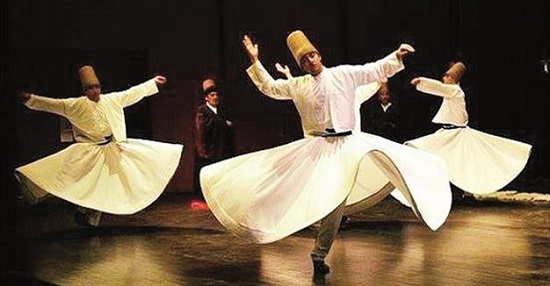
Whirling Dervishes are a tourist attraction in Turkey and people in the West think of it only as some type of entertainment. It is quite the opposite.
From 30 Days of Prayer for the Muslim World by 30 Days International:
“The movement of Sufism is widespread in many parts of the Islamic world. It emerged soon after the rise of Islam and emphasizes the inward, spiritual dimension of the Muslim faith. Sufis pursue a divine connection, sometimes through self-sacrifice or ecstatic forms of meditations, such as speaking or dancing themselves into a trance. An example of this is the Turkish Mevlevi Dervishes during their whirling dance.
“Every Sufi is member of an order that is formed around a grandmaster, who is a descendant of the prophet Muhammad and has great power over each member. The orders do not just influence their members, they have an impact on the whole society they are part of. In Turkey, for example, it is assumed that the faith and practice of almost all Muslims is shaped by Sufi ideas.
“Sufism is banned in a few countries for being politically active, but they exist and thrive throughout the Muslim world. In Turkey, the Naqshbandi Sufi order is very prominent and has influenced several key political leaders.
“The final goal of a Sufi is to embark on a journey to free themselves from the things of this world so they can focus on the love of God. Under the guidance of the master, a Sufi begins with the law (sharia), which includes the five pillars of Islam. The end of the journey is perfect knowledge and a ‘vision of God.’”
The Word: “By his divine power, God has given us everything we need for living a godly life. We have received all of this by coming to know him, the one who called us to himself by means of his marvelous glory and excellence” (2 Peter 1:3, NLT).
Pray on! Father, we ask that those practicing Sufism would make the divine connection they are looking for in Jesus.
DAY 14 (Thursday, May 7): Who are the Zaza people?
Prayercast calls the Zaza “remote, repressed, and neglected.” They are an unreached people group living in southeast Turkey. Most Zaza (about 1.5 million live in Turkey) consider themselves Kurdish. They are Sunni Muslim, but they also believe in mystical faiths like shamanism and Zoroastrianism.
Many Zaza also are nomadic, like the Kurdish people, shepherding their livestock and living as subsistence farmers.
“Years of repression and neglect have left (southeast Turkey) underdeveloped and its people in poverty,” Prayercast writes.
Our Kingdom worker in Turkey calls this home. His father and 90 percent of the people in the town where he lives are Zaza.
Among the problems in Zaza society are illiteracy, family and marital dysfunction, and great physical needs because of poverty and unemployment. But the biggest need is Jesus. There are only a handful of Christians among the Zaza.
The Word: “This has all been pioneer work, bringing the Message only into those places where Jesus was not yet known and worshiped” – Romans 15:20-21 (MSG).
Pray on! Father, the request of the Zaza people is to be treated the same as those around them in Turkey, not to be persecuted as a minority group. They need help from the government. We ask that they would not be a forgotten people. We also ask for resources to work among the Zaza. May they come to know You as the true God. CLICK HERE to watch a Prayercast video about the Zaza people.
DAY 15 (Friday, May 8): What do the Kurdish people believe?
.jpg)
Semi-nomadic Kurds shearing sheep on Mount Ararat. (Photo by Gary Fallesen)
“Kurdun heval ninin bes ciya (the Kurds have no friends but the mountain)” – A famous Kurdish proverb.
Robert L. Brenneman wrote in his book, As Strong as the Mountains: A Kurdish Cultural Journey, “When parents want to instill strength in their children, they merely point to the mountains and tell their children to be strong as the mountains are strong.”
We lift up our eyes to the mountains and acknowledge that our strength comes from the One who created them. He is the God of the Bible.
The 15-million-plus Kurds living in Turkey are predominantly Muslim. These are the people we have ministered to for many years. Quite often their brand of Islam is a folk religion.
“To understand the worldview of folk Muslims, including Kurds, one must realize that there is a sense of predestination (qadir, kismet), leading to resignation about life; at the same time, everything possible to change a person’s kismet may be tried,” Brenneman wrote. “High Islam is about submission to the will of Allah, but folk Islam is about manipulating kismet to change what has been ‘written in advance’ (maktub) – predestined.”
The Word: “I lift up my eyes to the mountains – where does my help come from? My help comes from the LORD, the Maker of heaven and earth” – Psalm 121:1-2 (NIV).
Pray on! Heavenly Father – Creator, Sustainer – we know that our help comes from You, and You alone. We look upon the mountains in awe because they are Your beautiful and wondrous creation. We pray that our Kurdish friends, especially those we serve in eastern Turkey, would recognize that You are their Strength. You are their Rock. May they turn to You and see that in You and through Your Son, Jesus, they can be destined for heaven.
DAY 16 (Saturday, May 9): When will we fly again?
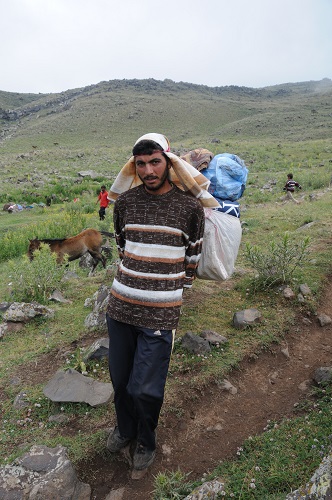
A shepherd on Mount Ararat, above, and a woman baking bread in her village beneath Ararat, below. (Photos by Gary Fallesen)
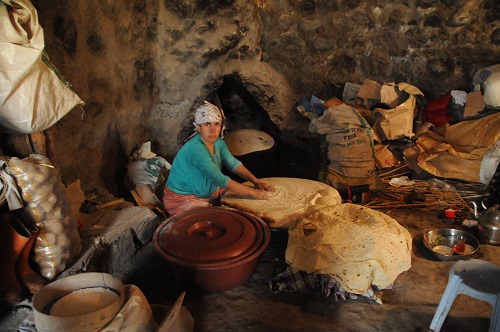
We have spent several Ramadans in Turkey, which – as I stated at the start of Project Prayer: Ramadan 2020 – helps us put a face on Islam. We know and love so many Muslims in so many countries that our hearts go out to them during this holy month. We are praying for them and for their salvation.
We would like to again be able to witness to them in person. We are scheduled to return to Turkey in late June for Mission: Ararat 2020 (see “In God’s time”). But, with COVID-19 continuing to plague the world, it is uncertain at this time whether we will be allowed to GO. We wait on the Lord, and today we ask for Him to open the door for us to return to the unreached Kurdish, Zaza, and Turkish people we have spent so much time with in the past.
The Word: “Wait patiently for the LORD. Be brave and courageous. Yes, wait patiently for the LORD” (Psalm 27:14, NLT).
Pray on! Father, we do wait on YOU, knowing that Your timing and Your plan are perfect. We ask that you open doors for us to return to Mount Ararat to minister to the people there. We lift our friends on and around Ararat and ask that You would continue to work in their hearts. We expectantly and excitedly ask for a great harvest among these people.
DAY 17 (Sunday, May 10): Do Muslims celebrate Mother’s Day?
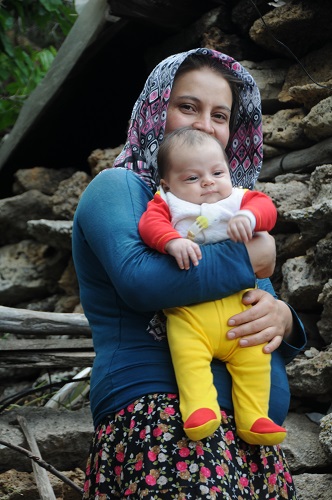
Muslim mothers and children, above and below, in Turkey. (Photos by Gary Fallesen)
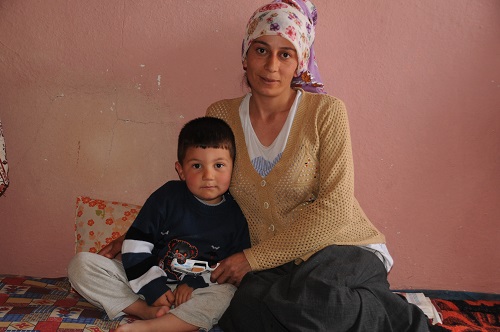
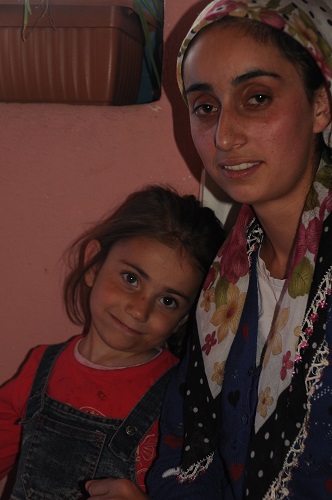
Happy Mother’s Day to all those moms in the world. We celebrate motherhood today in North America and we send our best to mothers in the Muslim world.
Muslims, for the most part, view Mother’s Day as a Western tradition. They see it as the one day children set aside in the West to honor their mothers. In their world, mothers are honored every day.
Dutifulness to parents is a sacred obligation in Islam.
The Qur’an states: “And We have commended unto man kindness toward parents. His mother beareth him with reluctance, and bringeth him forth with reluctance, and the bearing of him and the weaning of him is thirty months, till, when he attaineth full strength and reacheth forty years, he saith: My Lord! Arouse me that I may give thanks for the favor wherewith Thou hast favored me and my parents, and that I may do right acceptable unto Thee. And be gracious unto me in the matter of my seed. Lo! I have turned unto Thee repentant, and lo! I am of those who surrender (unto Thee).” (Surah 46:15)
Mother’s Day also is associated with a “feast” (big brunch or dinner). Since this is Ramadan, that would occur during the daily fast and be a no-no. In spite of all of this, we wish Muslim moms everywhere a “happy Mother’s Day!”
The Word: “Children, obey your parents because you belong to the Lord, for this is the right thing to do. ‘Honor your father and mother.’ This is the first commandment with a promise: If you honor your father and mother, ‘things will go well for you, and you will have a long life on the earth’” (Ephesians 6:1-3, NLT).
Pray on! Father, may you bless Muslim mothers everywhere on this day and every day.
DAY 18 (Monday, May 11): How hard is it to reach Muslims in … Tanzania?
TANZANIA is a majority Christian country – barely. About 51 percent of this East Africa nation of 58 million people follow Jesus. Islam is the other major religion in Tanzania (with 30-to-35 percent of the population claiming to be Muslim). Around Mount Kilimanjaro, it seems 50-50 Christian and Muslim. But some areas, like Zanzibar, are Muslim majority and, sadly, the targets of anti-Christian violence. Why?
“Jesus taught that there is only One God and only God should be worshiped as mentioned in Deuteronomy 6:4 and Mark 12:29. Muslims also believe this as taught in the Qur’an verse 4:171. Christians, on the other hand, worship God, His Son and Holy Spirit.”
This was reason No. 1 of 13 that one of Africa’s most famous football players, Emmanuel Adebayor of Togo, used when he announced he was converting to Islam. One of my Muslim friends in Tanzania directed me to the former Arsenal F.C. star when I asked him why he believed in Islam. (More about why this friend follows Islam tomorrow.)
As the MBB from Turkey said on Day 11: “They (Muslims) don’t believe that God has a Son.”
Failing to understand or accept the Trinity is what keeps many Muslims from following Jesus. We have been working with guides and porters in the Kilimanjaro Chapter for years to teach them how to share the Gospel with their Muslim co-workers.
The Word: “For there are three that bear witness in heaven: the Father, the Word, and the Holy Spirit; and these three are one” (1 John 5:7, NKJV).
Pray on! Heavenly Father, may our Muslim friends, neighbors, and co-workers come to understand that You are the Triune God. As Your Son Jesus instructed, we are to “go and make disciples of all nations, baptizing them in the name of the Father and the Son and the Holy Spirit” (Matthew 28:19). Use us to teach others how You are Three in One.
DAY 19 (Tuesday, May 12): Why are you a Muslim?
“I was born Muslim and I practiced (being a) Muslim and I am still learning about my religion,” said my Muslim friend in Tanzania.
He highlighted three facets of Islam that are important to him:
- “In our book, the Qur’an (Surah 5:32), it says to us as a Muslim, do not kill except what is allowed to be killed – and that means for food, like killing animals, birds, fish, etc. Instead, it says to us, if you save someone from death, it means you have saved the whole world. And if you kill one person, it means you have killed the whole world. So, all that is going on in the world – like Iraq (ISIS), Al-Qaeda, Al-Shabab – it is not a religion war. It’s brainwashing. And I am sure there are big countries supporting that.”
- “Qur’an 4:36 says it’s our obligation to care and respect neighbors without judging their religion or tribe. Because the neighbor just happens to be your neighbor. So, you have to make sure he or she is happy with you. If she or he is sick, even during the night, you have to be there to help.”
- “Qur’an 2:183 says we have to fast during Ramadan as others before us. That will (build) our faith. By feeling hungry it will make us feel how poor people feel, and that will push us to help them. Also, because Allah loves us, that is why we have to fast – so that we can clear all the foods’ poison we have eaten all year-round. Then after Ramadan we start healthy again.”
I have many Muslim friends and we spend time discussing what we believe and why. We need to listen, to understand, and to pray before we speak. When we speak, we must do so with love. Little fills my heart with greater joy than seeing a Muslim friend become a brother or sister in Christ.
The Word: “Spouting off before listening to the facts is both shameful and foolish” (Proverbs 18:13, NLT).
Pray on! Father, we know that all of heaven rejoices when one repents. We are honored when you allow us to see Muslim friends and neighbors accept Your Son, Jesus, as their Savior and Lord. We give You the praise, honor and glory.
DAY 20 (Wednesday, May 13): Is there another path to heaven?

There are many ways to climb Mount Kilimanjaro in Tanzania: the Shira, Lemosho, Machame, Umbwe, Mweka, Marangu and Rongai Routes. But only one way to heaven: Jesus Christ.
My Muslim friend stood on the trail and pointed to the summit of Mount Kilimanjaro looming ahead of us. “There are many ways to the top of the mountain,” he said. “You may take one route and I may take another. We will end up at the same place together.”
That may be true of a mountain, but his analogy failed on our walk through life. All religions do not lead to the summit. In fact, only one does. The others take you in the wrong direction.
Jesus Christ, our Savior and Lord, told His followers: “You can enter God’s Kingdom only through the narrow gate. The highway to hell is broad, and its gate is wide for the many who choose that way. But the gateway to life is very narrow and the road is difficult, and only a few ever find it” (Matthew 7:13-14, NLT). He warned us, “Beware of false prophets who come disguised as harmless sheep but are really vicious wolves” (Matthew 7:15).
The Word: “Jesus answered, ‘I am the way and the truth and the life. No one comes to the Father except through me’” (John 14:6, NIV).
Pray on! Father, show our Muslim friends the Way to go. May they recognize the false prophets, who would deceive them and lead them astray. May they accept the Truth. You said to Your people (through the prophet Jeremiah), “When people fall down, don’t they get up again? When they discover they’re on the wrong road, don’t they turn back?” May those on the road following Islam turn back and walk in Your direction.
DAY 21 (Thursday, May 14): What is the cost for a Muslim to accept Jesus?
It can be tremendous.
In his book Seeking Allah, Finding Jesus, Muslim background believer Nabeel Qureshi wrote: “…following Jesus meant that I would immediately be ostracized from my community. For all devout Muslims, it means sacrificing the friendships and social connections that they have built from childhood. It could mean being rejected by one’s parents, siblings, spouse, and children.”
In Islam, there is one unforgivable sin, called “shirk,” which is the belief that someone other than Allah is God. Surah 5:72 in the Qur’an declares that anyone who believes in Jesus “for him Allah hath forbidden Paradise.”
A decision to follow Jesus also threatens to bring shame and dishonor to an MBB’s family. Such dishonor is the driving force behind so-called honor killings in the Muslim world.
As Nabeel Qureshi prayed the prayer below, “I hoped beyond hope that Allah would reveal Himself to be the God of Islam.”
The Word: “Keep on asking, and you will receive what you ask for. Keep on seeking, and you will find. Keep on knocking, and the door will be opened to you. For everyone who asks, receives. Everyone who seeks, finds. And to everyone who knocks, the door will be opened” (Matthew 7:7-8, NLT).
Pray on! Father, may other Muslims do as Nabeel Qureshi once did. May they pray using Matthew 7:7-8 and Surah 2:186 (“And when My servants question thee concerning Me, then surely I am nigh. I answer the prayer of the suppliant when he crieth unto Me, so let them hear My call and let them trust in Me, in order that they may be led aright”). May they ask, as Nabeel said, “If Allah confirm(s) to me personally that He (is) actually the God of the Bible, I (will) accept Him, Jesus, as my Lord.” Reveal Yourself, Father, as the God of the Bible – the One and Only God. Give Muslims the courage to accept You no matter the cost.
DAY 22 (Friday, May 15): What’s so special about Friday?
Friday is the Islamic Sabbath day. The daily repetition of prayers (or salat) varies on the Sabbath. An imam, the one who leads prayers in the mosque, gives a sermon and then leads the jumaa prayer.
Jumaa means “congregated” and it can only be prayed when three or more Muslims are gathered.
The jumaa prayer is so important that the word for Friday in Arabic and Urdu is named after it. If a Muslim misses three jumaa prayers in a row, they have a black scar on their heart that can never be removed.
The Word: “For where two or three gather together as my followers, I am there among them” (Matthew 18:20, NLT).
Pray on! Father, when three or more gather for the jumaa prayer, may Your presence be felt.
DAY 23 (Saturday, May 16): Do Muslims go on mission trips?
.jpg)
The Muslim world today.
Christians are not alone in the mission field. Muslims also are evangelizing the world.
Islam is expanding daily – first through a birth rate that is greater than the world average (and far exceeds that of Christians) and then through what some call “conversion by coercion.” That is, forced conversion.
But Muslims also are on mission.
According to Pew Research, evangelism has no net impact on the Muslim population as the number of people who convert to Islam is nearly equal to those who leave Islam. However, that does not stop followers of Islam from trying. In particular, Saudi-financed missionary work promotes the building of mosques, Islamic schools, and the distribution of publications explaining Islam.
“Billions of oil dollars are available to Muslim ‘evangelists,’” a story in Mission Frontiers magazine explained. “Islam is also a zealously ‘evangelistic’ religion. The purpose of Muslims is to win the Western world to Islam. If you think that can’t happen, think again. Some areas evangelized by Paul are now firmly under the sway of Islam.”
Pew Research declared in 2017: “In the next half century or so, Christianity’s long reign as the world’s largest religion may come to an end. Indeed, Muslims will grow more than twice as fast as the overall world population between 2015 and 2060 and, in the second half of this century, will likely surpass Christians as the world’s largest religious group.”
The Word: “We must quickly carry out the tasks assigned us by the one who sent us. The night is coming, and then no one can work” (John 9:4, NLT).
Pray on! Father, we know there is work to be done. Here we are; send us! We pray that more workers will be willing to GO – next door and to the ends of the earth. Use us to glorify Your name. Expand Your kingdom on earth and in heaven. Amen.
DAY 24 (Sunday, May 17): Should we pray for persecuted Muslims?
The Uyghur people, nearly 12 million Muslims, have long been persecuted by China’s communist (read: atheist) government – with perhaps one million held in so-called re-education camps. In Myanmar, an ethnic cleansing of the Muslim Rohingya people has turned a minority people of about one million into an even smaller people of about 473,000. In India, the Hindu nationalist government has fueled growing violence against religious minorities, including more than 425 Muslim people groups.
What do all these Muslim people have in common? In addition to being attacked by their own governments, each is considered a Frontier Unreached People Group (FUPG) – the most unreached people in the world. There are more than 5,000 FUPGs globally.
God does not celebrate the misfortune of these nonbelievers. “Do you think that I like to see wicked people die? says the Sovereign LORD. Of course not!” (Ezekiel 18:23). We, being the Church, should do all we can in our power to see these millions of persecuted Muslims brought to faith. It starts in prayer.
The Word: “I urge you, first of all, to pray for all people. Ask God to help them; intercede on their behalf, and give thanks for them. … This is good and pleases God our Savior, who wants everyone to be saved and to understand the truth” (1 Timothy 2:1, 3-4, NLT).
Pray on! Father, in the chaos and confusion of this world, where people fight one another over politics and religion, may Your peace be experienced. We ask that those living in darkness and fear, those who are under attack in their own countries, would come to a saving knowledge of Your Son, Jesus.
DAY 25 (Monday, May 18): Why are Muslims coming to Christ?
Brothers and sisters in Christ, like you, are increasingly uniting before the Lord to intercede on the behalf of family, friends and neighbors in the Muslim world. God hears our prayers. God is responding. If you are reading this and participating in Project Prayer: Ramadan 2020, you are among tens of thousands of believers joining in these “30 Days of Prayer for the Muslim World.” Thank you!
Miracles, dreams and visions; exposure to Scripture; laborers being called from China, South America, and Africa; and MBBs sharing their new-found love with their own people are other ways Muslims are being led to Jesus.
Zealots using terrorism have produced fear in Islam and provided opportunities for followers of the Prince of Peace. An unprecedented refugee movement also has landed scores of Muslims in Christian communities. God is bringing the ends of the earth to the Church. It is time to shine!
The Word: “His purpose was for the nations to seek after God and perhaps feel their way toward him and find him – though he is not far from any one of us” (Acts 17:27, NLT).
Pray on! Father, draw those in the Muslim world nearer to You. Hear our prayers. Speak to Muslims through dreams and visions. Send laborers to the harvest. Give MBBs the knowledge and desire to share Your truth with those all around them. Thank You for putting Muslims in our paths; may we respond according to Your will and share the love of Jesus with them. To Your glory!
DAY 26 (Tuesday, May 19): What is the ‘Night of Power’?
Tonight is the night. It is the most important night of the year for Muslims. Laylat al-Qadr (the Night of Power) is said to be more valuable than a thousand months of regular worship.
The Night of Power commemorates the night that Muhammad had his first encounter with an angel in a cave near Mecca (see Day 5). It is the night when Allah might reveal to a Muslim their destiny for the next year.
It will be a night of worship. A night spent reading the Qur’an. A night spent in the mosque. A night of prayer. It is our prayer that this is the night Jesus will reveal Himself to Muslim family, friends, and neighbors.
The Word: “I am the good shepherd; I know my own sheep, and they know me… I have other sheep, too, that are not in this sheepfold. I must bring them also. They will listen to my voice, and there will be one flock with one shepherd” (John 10:14, 16, NLT).
Pray on! Father, we ask that You reveal Yourself tonight to those Your Spirit has prepared to hear Your voice. Bring many from Islam into Your flock so they will know You as the Good Shepherd. CLICK HERE for an excellent prayer for the Night of Power from Prayercast.
DAY 27 (Wednesday, May 20): Are dreams producing a great harvest?
God can reach people in whatever way He chooses. He has been using dreams and visions in the Muslim world for many years.
“God’s Holy Spirit is at work across the Muslim world,” Kevin Greeson wrote in The Camel: How Muslims Are Coming to Faith in Christ! “But God’s plan of salvation is not to evangelize the world through dreams. He commands us to take the Gospel to a world that is lost apart from salvation in Jesus Christ.”
We prayed yesterday – on the Night of Power – for Jesus to be revealed to Muslim family, friends, and neighbors. Those revelations are opportunities for Christ followers to act.
“These dreams are God’s invitation to Muslims to come to the light of the Gospel,” Greeson wrote. “They should also be a reassurance to us that we are about a mission that is divinely ordained and empowered by the Holy Spirit. We do not go into our mission alone or under our own power. God is already at work among Muslims and invites us to share in the joy of reaping where we have not sown.
“If you obey God’s commission to enter the Muslim world, you should look for and listen for Muslims who are having dreams. The Apostle Peter instructed us to ‘Always be prepared to give a reason for the hope that is within you’ (1 Peter 3:15, NIV). If you are ready, you may be the one to answer a Muslim dreamer’s questions about the man in the white robe [Jesus] or an unknown beam of light who is haunting his dreams.”
The Word: “And he was transfigured before them, and his face shone like the sun, and his clothes became white as light” (Matthew 17:2, ESV).
Pray on! Father, we acknowledge and give thanks that You are at work in the Muslim world. We also thank You for the opportunity You give us to answer questions about Who You are. Prepare us, Father, so we may give the reason for the Hope that is within us.
DAY 28 (Thursday, May 21): How do I share with my Muslim neighbor?
You may live next door to a Muslim or have a co-worker or fellow student who is a believer of Islam. Or not. It doesn’t matter. Jesus made it clear in the Parable of the Good Samaritan (Luke 10:25-37) that all Muslims are our neighbors. To the ends of the earth.
So, how do you share the love of Christ with your Muslim neighbor? First, you must GO – across the room, across the street, or across the planet. After that, here are some suggestions from Gerald R. McDermott’s The Baker Pocket Guide to World Religions:
- Show real interest in Islam. Study it. Read at least a few chapters (surahs) of the Qur’an so you can honestly say you have read part of it when discussing Islam with a Muslim.
- Be slow to criticize. We know the Truth, but we must use gentleness in leading others to an understanding of Jesus.
- The incarnation is difficult for Muslims to understand or accept. “Charles White, a missionary to Muslim parts of Africa, used to tell his students about the man who became an ant. He saw ants going into a house where they would be poisoned. He told them over and over not to enter, but they didn’t listen. Finally, the man became an ant so the other ants could hear and understand. By becoming one of them, this man was able to save ants from destruction. This story helped Muslims understand why God became a man in Jesus Christ.”
- Emphasize forgiveness. The Gospel message that Jesus came to save sinners can be appealing to a Muslim who “feels crushed by the demands of the law.”
- Show your neighbor respect. Recognize the religious truth they may already have. Remember, Cornelius feared God and prayed regularly to God before he heard about Jesus (Acts 10:2). He was given a vision (“a man in shining clothes stood before me”) as he prayed, and he was instructed to seek a man of God (Peter). “So I sent for you immediately, and it was good of you to come. Now we are all here in the presence of God to listen to everything the Lord has commanded you to tell us” (Acts 10:33, NIV).
You, too, could be a person of God who gains the respect of a household and through the Holy Spirit’s power leads your neighbors to a soul-saving knowledge of Jesus.
The Word: “…love your neighbor as yourself.” (Leviticus 19:18 and Mark 12:31, NIV).
Pray on! Father, send us. Burden our hearts with a desire to GO and share the love of Your son, Jesus, with our neighbors. Teach us to be Your witnesses – near and far.
DAY 29 (Friday, May 22): What does I.S.L.A.M. stand for?
Brother Andrew, the missionary known as “God’s Smuggler” for his delivery of Bibles into communist countries and the founder of Open Doors ministry, turned Islam into an acronym. Islam stands for I Sincerely Love All Muslims.
We love Muslims because we are children of the God of love.
I have many Muslim friends in several countries. In two of those countries, friends I love dearly have called me “brother.” But I am not their brother. To accept being called “brother” or to call them “brother” would mean I accept their theology, which I do not.
One of those friends who called me “brother” came to realize this truth – through our prayers and loving witness for several years. He is now our brother in Christ. The other friend is still inching toward that reality.
At the start of Ramadan, I talked about numbers (5.2 billion non-Christians, including 1.83 billion Muslims) and how overwhelming that can be unless we put a face (just one face) to all of this. I have many faces in my mental photo album as well as the photo folders on my laptop and in my phone. Here are two of them – the young and the old:

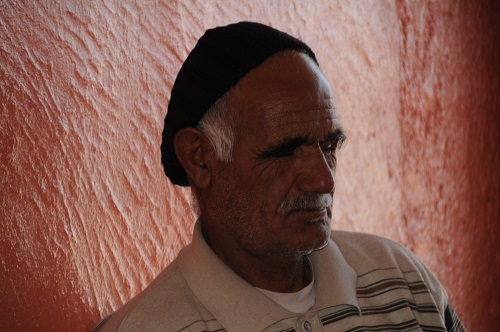
I Sincerely Love All Muslims. I pray you do, too.
The Word: “For God so loved the world, that he gave his only Son, that whoever believes in him should not perish but have eternal life” (John 3:16, ESV).
Pray on! Father, we love because you first loved us (1 John 4:19). May we share that love with those who do not yet know You. Thank You, Lord, for this love. 
2428